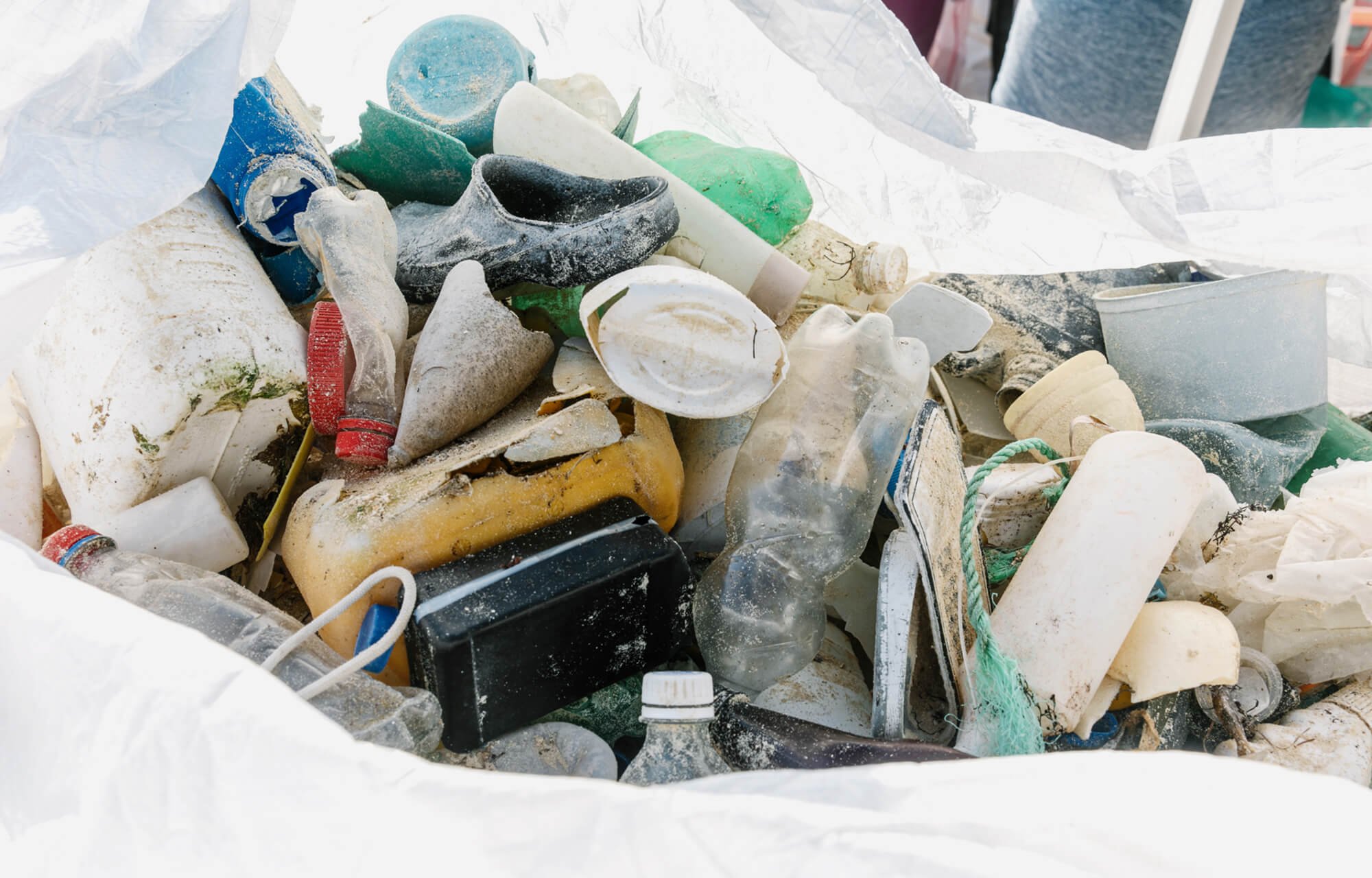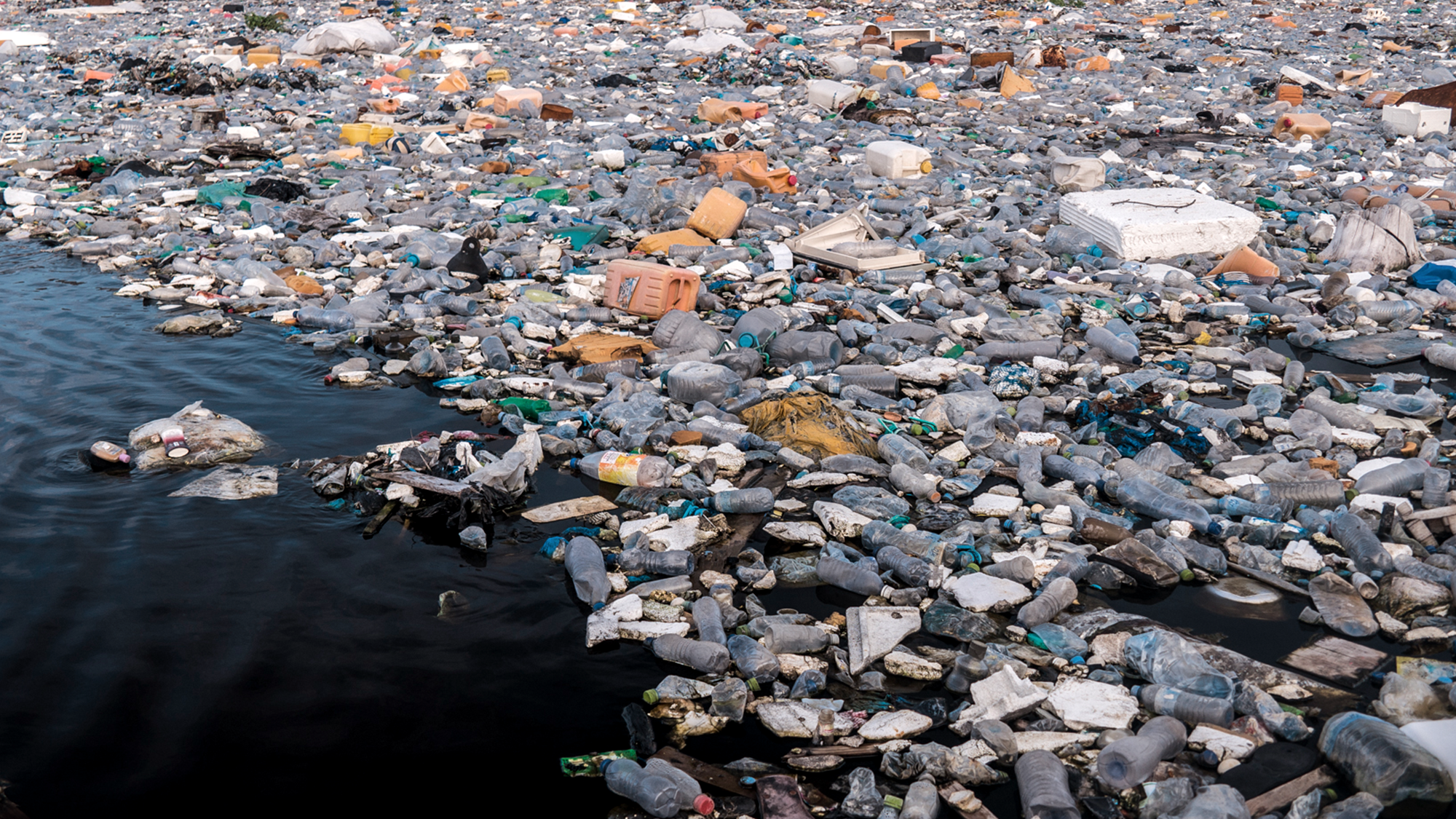Parley AIR: Plastics and the Pandemic
The plastics industry has used the global COVID-19 pandemic to push single-use plastics
At a 2019 plastics industry event, one corporate leader reportedly remarked: “We need to get the image of plastic in oceans out of the public’s mind. Otherwise, we could lose our social license to operate.” Backlash against plastic was gaining momentum and threatening the future of the plastics industry. But when the World Health Organization (WHO) declared COVID-19 a global pandemic on March 8, 2020, demand for single-use plastics skyrocketed.
It was an emergency, with human lives at stake. At first it seemed like a silver lining would be a win for the planet: The air cleared in the absence of rush hour traffic, wild animals began to reclaim our built environments. “Nature is healing” entered meme culture. But that was short lived. In the long-run, the pandemic caused a rush of single-use plastic takeout containers and utensils, vital PPE made from plastic, disposable masks, vaccine syringes and gloves. Some grocery stores stopped allowing customers to bring in reusable bags. Routines were upheaved and priorities shifted in a time of fear, uncertainty and overwhelm.
As the planet warms and we continue to destroy habitat, experts predict future pandemics will come with more frequency. We’re still experiencing the first widespread, ongoing pandemic of the modern age and only beginning to understand the long-term ecological, economic and societal impacts. After three years of loss, hard lessons and new questions, it’s time to take what we’ve learned and design ways to protect human health alongside ocean health — two imperatives which are inextricably interconnected.
Take the Parley AIR Pledge and receive our monthly newsletter
Plastic PANDEMIC
A year after declaring that shifting public perception of the harm plastic does to the planet would be vital to the future of the industry, at virtual World Petrochemical Conference in April 2020, an industry analyst said: “Ironically, sustainability, the issue that was dominating the conversation until just a few weeks ago, seems to be fading into the background, at least for the moment. And polyethylene may even be gaining some public favor as it plays a high-profile role in combating the greatest health risk to our planet in modern history.”
Acceptance grew largely because single-use plastics were seen as necessary. In the first part of 2020, we used an estimated 129 billion face masks and 65 billion gloves every month. Spread out, that would cover an area the size of Switzerland. Every. Single. Month.
When masks and gloves find their way into our rivers – a key way single-use plastic pollution gets into our oceans – they can easily be mistaken for jellyfish, a favorite food of sea turtles. And that’s just PPE. Demand for takeout also skyrocketed and single-use items became synonymous with safety.
One early study estimated that humans generated 30% more waste in 2020 than we did in 2019. Another estimated that in the first year and a half, the pandemic generated an additional 8 million tons of plastic waste specifically – 25,000 tons of which ended up in our oceans.
At the same time as demand for plastics ballooned, the price of oil collapsed, making virgin plastic cheaper than ever to produce. Oil prices fell by almost 20% in the first quarter of 2020. The lower the price of oil, the lower the value of recycled plastic, meaning it’s cheaper (and therefore more enticing) for companies to use virgin plastic over recycled material.
The plastics industry hasn’t stopped trying to use the COVID-19 pandemic to push demand for cheap plastics. In July 2021, the European Commission was asked to delay the EU’s ban on single-use plastics. The request was denied, but the pandemic delayed — and in some cases even reversed — plastic-curbing legislation in North America, Europe, Africa, and Asia.
A PANDEMIC FUTURE
Already, about 60% of known human infectious diseases have originated in animals, and over half of all infectious diseases have been aggravated by climate change. Ironically, plastic production and pollution is both accelerating climate change and having its own impact on human health.
The human consumption and burning of fossil fuels has heated the planet exponentially since the early 1900s. Even just a couple degrees can cause massive shifts in our ecosystems – in our planet’s history, a change of a degree or two was enough to cause an ice age.
Climate change is altering the habitats that mammals have lived in for millennia, forcing them to shift into territories they haven’t normally inhabited. As they encounter other mammals for the first time, scientists predict they will share thousands of viruses.
At the same time, humans are continuing to encroach into previously intact areas, cutting down forests to create farmland and build new cities. This trend opens up new, and more frequent, opportunities for human-wildlife interactions, and therefore more opportunities for viruses – like novel coronaviruses or Ebola – to jump from animals to humans.
Scientists have realized for decades that the combination of environmental degradation and climate change will make pandemics more frequent. We’ve just seen the beginning.
3D printing protective visors using Ocean Plastic®
MATERIAL REVOLUTION
Unprecedented was a word we heard — and hear — time and time again, especially during the first couple years of the pandemic. We had to act fast, and respond to a situation we hadn’t encountered before. Now we have. It’s no longer new. We know what we need to do to prepare, now we just need to act on it.
While we may not be able to stop future pandemics, we can redesign the materials that can replace single-use plastics in things like masks, shields, gloves, vaccines and medicines. The COVID-19 pandemic accelerated advances in medicine. It showed how, when the world’s resources are put towards a common goal, huge change can happen, and it can happen quickly. Just like medicine, we have the opportunity to accelerate change in the materials we use, the materials that can replace plastics for good, now and in the future. We can respond to future pandemics not with plastic, but with a material revolution, and use increased demand to accelerate our move towards better design.
To help protect frontline workers and the oceans, Parley donated 2.28 metric tons of Ocean Plastic® pellets – equivalent to more than 230,000 plastic bottles, which were intercepted by our teams in the Dominican Republic – to an organization called HEROES. In partnership with SHIELD, its sister PPE organization, HEROES produced and distributed 50,000 protective visors. Half ended up in the hands of healthcare workers in the United Kingdom while the other half were donated to NGOs and hospitals in the Dominican Republic.
“Like every major threat to humanity and our future, the COVID-19 pandemic can only be solved with unprecedented levels of collaboration and eco-innovation. With PPE washing ashore on our beaches, we are challenged to find ways to protect each other while continuing the work of protecting our planet and its life-giving ecosystem.
These goals are not mutually exclusive. By working with HEROES to create and distribute reusable PPE, we are able to combine our efforts in the fight against marine plastic pollution with the immediate needs of essential workers and healthcare professionals on the front lines — allowing us to move forward against one existential threat without sacrificing hard-fought progress to end another.”
Cyrill Gutsch — Founder and CEO, Parley
What it will take to change
It's impossible to talk about the pandemic without ruffling some feathers. A global pandemic, something that affected every person on the planet, could have united us. When the world shut down, it could have been a reset button for how humanity was moving forward. But was it?
We're all still processing what's happened since 2020. But it’s clear that a global crisis that might have rallied us together instead demonstrated the distance between our siloes of perception.
It does, however, give us an opportunity to dig into the following question on a personal level: How has the pandemic shifted your view of environmental threats like plastic pollution, and how you perceive the role of the individual in fighting single-use plastic waste?
Why is the onus on the individual rather than on the companies that create products – even life-saving PPE – that kill our planet? Why is plastic our only option?
A lot of us reshaped our habits during the height of the pandemic, including regularly eating takeout in an effort to keep local restaurants afloat. Now that economies have reopened, we can take a look at what plastic-consuming habits we may have developed during these unprecedented times and adjust – but to truly change, we need to put pressure on governments, design leaders and corporations to change course. Now. Before it’s too late. Before there’s more plastic in the oceans than fish. Before the next global pandemic.
TAKE ACTION
Read up, make noise, spread the word and give others the tools to do the same. Systemic change won’t come unless we demand it.
IG @parley.tv | FB @parleyforoceans
#ParleyAIR



































